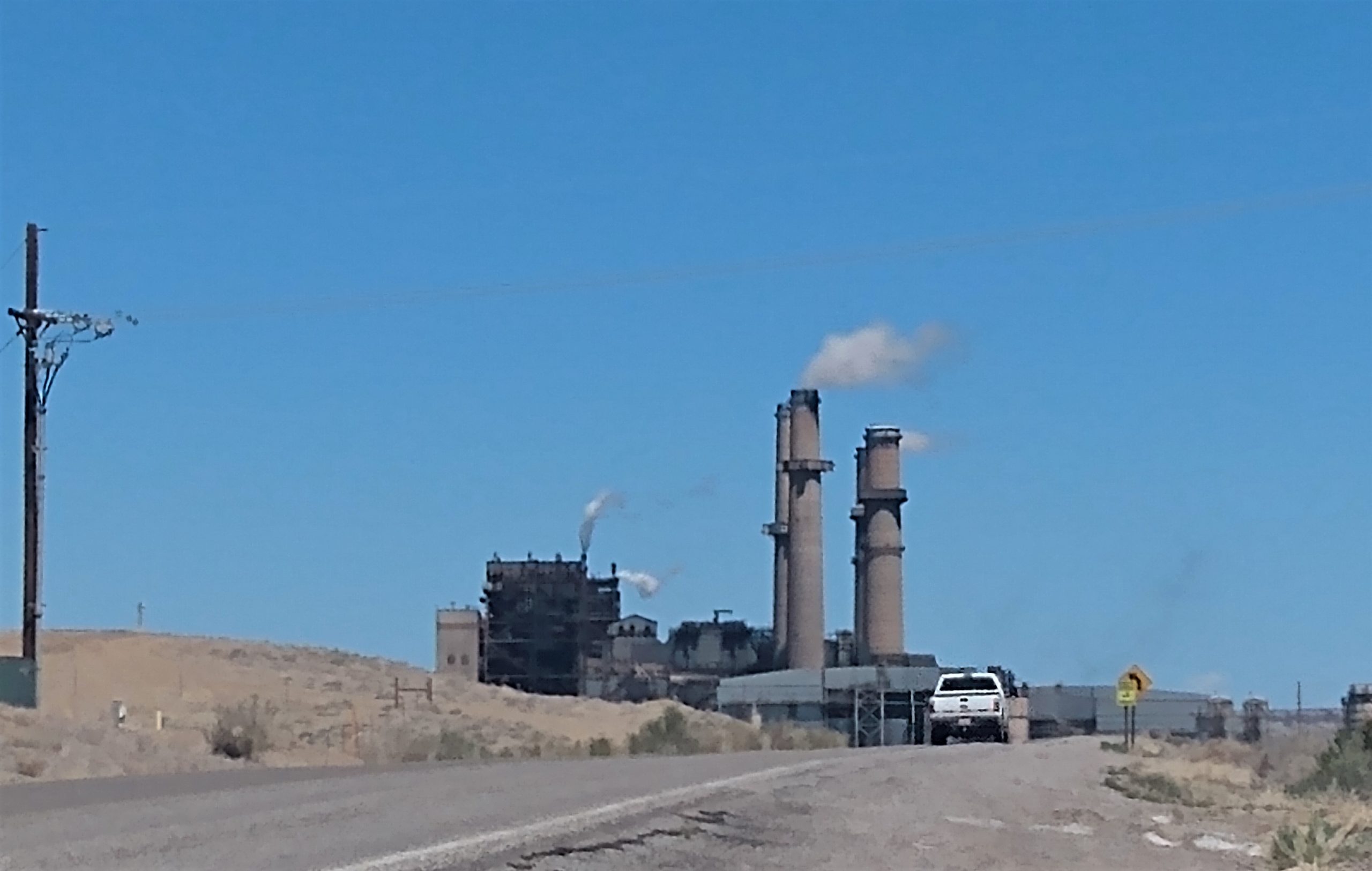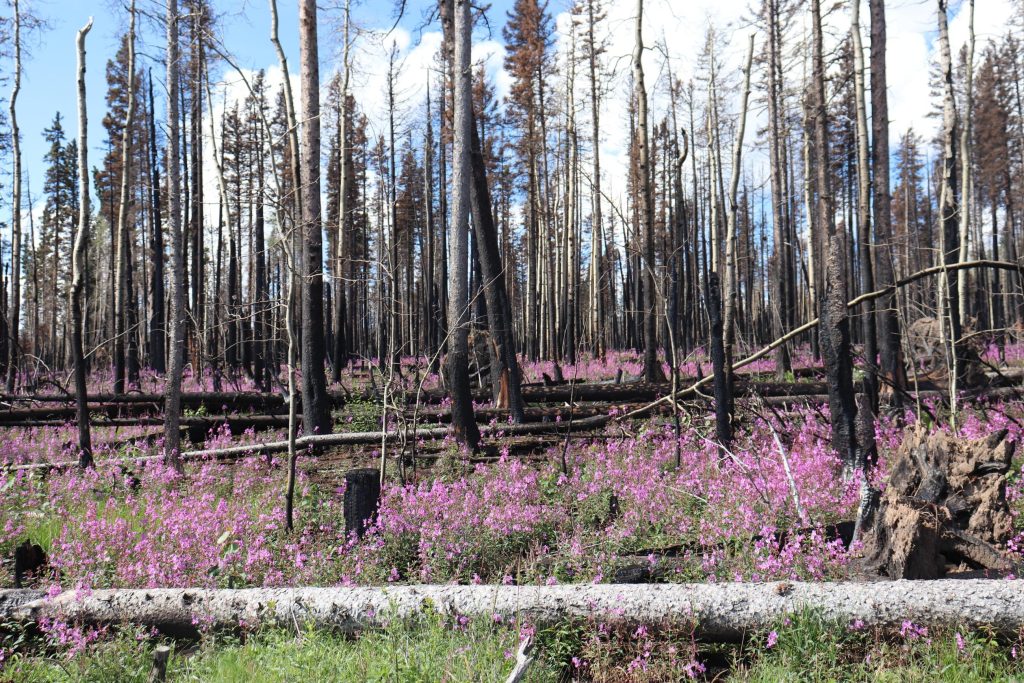It was July 1, 1969. Representatives of Public Service Company of New Mexico and Tucson Gas and Electric signed an agreement to partner on the San Juan Generating Station. The first unit would be 330 megawatts and the two entities would evenly share the ownership and power generated.
More than half a century later, the power plant they agreed to build is shutting down this week and for many of the activists who have fought against the coal-fired facility the moment feels a bit bittersweet.
While they are excited to see the power plant that has emitted pollutants close, they say their work is not yet over.
“I think that there’s three factors surrounding the closure of San Juan Generating Station,” Camilla Feibelman, the director of the Sierra Club’s Rio Grande Chapter, said.
One, she said, is that coal lost its economic prowess in recent years.
“Part of that is just how quickly renewables got cheap and accessible,” she said.
The costs of electricity from utility-scale solar dropped 85 percent from 2010 through 2020.
At the same time, Feibelman said utilities had to meet state renewable energy requirements. At the time that PNM announced plans to close the plant, those requirements were 20 percent renewable by 2020.
Another factor Feibelman said led to San Juan closing was that “coal has really externalized the environmental costs of the mining and the community health impacts.”
“There were just really powerful on the ground groups like San Juan Citizens Alliance and Diné C.A.R.E. who have been fighting for decades to really protect their community’s health,” she said. “And I think without organizations like that really kind of calling PNM to the table, we might not be in this moment.”
Finally, she said there is a nationwide and even global movement to “do something about the devastating costs of climate impacts.”
“All of those things today have really changed the landscape,” Feibelman said.
Early opposition to the San Juan Generating Station
Opposition to the San Juan Generating Station began even before its construction.
New Mexico Citizens for Clean Air and Water filed the first opposition to the power plant when PNM sought authorization from the New Mexico Public Service Commission, a predecessor of today’s New Mexico Public Regulation Commission, to build, own and operate the San Juan Generating Station. The group argued against the plant on the basis of the air pollution it would cause and it claimed the generating station was not necessary.
“Electric power services in the State of New Mexico do not presently need to be expanded and future needs are not critical enough to require an immediate hearing, particularly when balanced against the future welfare of this State,” the group stated in its petition to the Public Service Commission.
New Mexico Citizens for Clean Air and Water was the sole group that filed to intervene in the case on behalf of the environment.
Peter Montague, who was a prominent environmental activist at the time, presented arguments to the Public Service Commission but was unable to persuade the regulators to deny PNM’s request.
According to Public Service Commission documents, the projections at the time indicated communities in north central New Mexico could face power shortages if new electricity in 1973 was not brought online. At the time, coal was the most feasible option due to costs.
The power plant grew from one unit to four units. In its peak, the power plant served areas throughout the southwest and as far as Anaheim, California.
Mike Eisenfeld, a Farmington resident and the energy and climate program manager for San Juan Citizens Alliance, recalls a brown cloud hanging over the area when he moved to San Juan County. This cloud was attributed to the coal-fired power plants.
Changing public perception about coal
By the early 2000s, the attitudes about coal-fired power plants had changed. Coal itself had faced decreasing support from the public through the 1990s despite federal efforts to improve perceptions. The U.S. Department of Energy engaged in what it called clean coal outreach that worked to convince people that coal was essential for the country’s future and that the coal’s future relies on acceptance of clean coal technology.
Concerns about climate change, air pollution and acid rain fueled the changing attitudes about coal.
In 1997, a member of the National Mining Association spoke at an industry conference. The abstract for his talk stated that the industry had lost the public relations battle when it came to acid rain and was losing on the global warming front.
“The public should be told about the new clean coal technologies, and that using coal avoids the energy security problems of natural gas and oil,” the abstract states. “One way of spreading the message is to make contact with schools. There is certainly no need to fabricate a good image – the coal industry definitely is cleaner than it was ten years ago.”
Eisenfeld recalled successfully advocating against a proposal for a coal-fired power plant that would have been built on Navajo lands in San Juan County. This project, known as Desert Rock, fell apart around 2009 as California utilities backed away from coal-fired generation and as environmental activists filed lawsuits to stop projects from moving forward.
According to the U.S. Energy Information Administration, coal production peaked in the 2000s and the past decade has seen a steady decline in coal. Nearly a third of the U.S. coal fleet that was available in 2008 has since retired.
Lawsuits pile up
Existing coal plants also came under scrutiny. In 2002, the Grand Canyon Trust and the Sierra Club filed suit against PNM for pollution from the San Juan Generating Station. The groups alleged that PNM was violating the Clean Air Act because Units Three and Four did not have what is known as a Prevention of Significant Deterioration, or PSD, permit.
Later, in 2012, following efforts by groups like San Juan Citizens Alliance, WildEarth Guardians and Carson Forest Watch, the administrator of the U.S. Environmental Protection Agency found that the permit for operating the power plant did not comply with the Clean Air Act.
Ultimately, PNM reached an agreement. Two units shut down in 2017 and pollution controls were installed in the remaining two.
Air quality was not the only area where PNM faced lawsuits. In 2010, the Sierra Club sued PNM over coal ash and its impact on water.
PNM’s 2017 integrated resource plan filing caught San Juan County and Farmington officials off guard. They thought that the plant would continue operating into the 2050s. But PNM found it would save customers money to close the power plants. With the exception of the City of Farmington, the other owners agreed.
The advocacy work continues
Farmington is fighting to keep the power plant going, including filing a lawsuit in district court in an attempt force the other owners to transfer the ownership to the city.
Farmington’s plan is to transfer the majority of the ownership to Enchant Energy, a relatively new company that hopes to install carbon capture technology on the plant.
Eisenfeld is concerned that the municipality could get stuck with what he called a toxic liability.
Mariel Nanasi, executive director of New Energy Economy, joined the opposition to the San Juan Generating Station in 2008.
With the power plant closing, her organization has kicked off a letter writing campaign and has placed ads in both the Santa Fe Reporter and the Santa Fe New Mexican.
The ads declare in big bold letters: “Victory! San Juan Coal Plant closed.”
“I literally believe that…people will breathe easier,” Nanasi said, calling the closure a “monumental moment” for the environment.
The ads go on to state that NEE’s work isn’t over. Nanasi said now the organization will be fighting to get the site cleaned up.
PNM’s plan that was submitted to the PRC calls for what is known as retirement in place. That means the power plant won’t be demolished until a later date, likely decades down the line.
San Juan County passed an ordinance last year to prevent that from occurring.
But, Nanasi said, before demolition and remediation can occur, NMED should conduct an independent assessment to determine the level of pollution and to develop a plan for cleaning up the site.
The letter writing campaign that NEE is spearheading focuses on three areas of potential pollution: the coal ash that has been placed in surface mine pits, a nitrate plume from spilled contaminants and an area that the group refers to as “the golden pond.” The golden pond was a place where wastewater was discharged into an unlined area.
Nanasi expressed concerns that the pollutants could one day reach the San Juan River.
She said the state must also ensure that the site is monitored in the future.
Norman Norvelle, a Farmington resident who once worked at the power plant and later as a consultant in the electricity field, said the plant should have shut down years ago.
“PNM basically ran it into the ground,” he said, highlighting a cooling tower collapse that occurred last year.
He said keeping the plant running would be very expensive.
At the same time, he expressed concerns about power shortages as replacement resources are not yet available.
Steven Michel advocated for the closure while working for Western Resource Advocates, though he is no longer with that organization.
He said it is gratifying that the plant will no longer be polluting the environment, but he had concerns about PNM’s appeal of the PRC’s order that the utility issue rate credits to customers.
Both Michel and Nanasi expressed hope that the state Supreme Court will soon uphold the PRC’s order so that customers do not continue to pay for the San Juan Generating Station without benefiting from it.





















